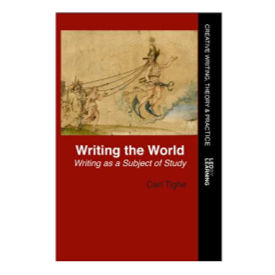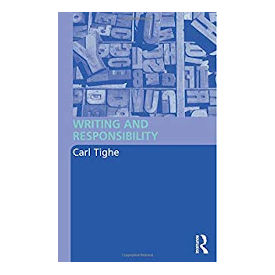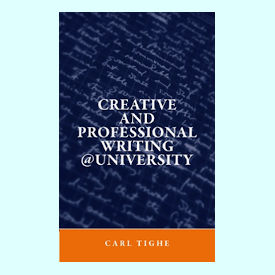Carl was Professor of Creative Writing at Derby University (1998-2015). He not only taught the ‘process’ of Creative Writing through writing workshops but he was also concerned the ‘subject’ should be studied within its historical and social context. Carl’s colleague at Derby, novelist Moy McCrory, says of him: ‘While programme leader he took the subject of Creative Writing in new directions. His was a mind of clarity and determination, passionate about the value of language.’

Paperback (324 pages)
| Publisher | Kingston University Press (6 Mar. 2014) |
| ISBN-13 | 978-1899999538 |
Writing the World sets the act of writing in a historical and social context and explores writing as a creative act. It sets out the main theoretical issues that shape the subject and investigates the debates about the history, theory and philosophy of Creative Writing.
Carl Tighe provides an informative and engaging guide, a teaching tool and textbook study section at the end of each chapter enables writers to develop their own thought and practice. The range and detail ensures its value as reference work. By considering the roots of Creative Writing as a subject of study, Writing the World provides a ground-breaking and absorbing contribution to the field.
Paperback (176 pages)
| Publisher | Routledge; 1 edition (9 Dec. 2004) |
| ISBN-13 | 978-0415345637 |
Kindle edition
| Publisher | Routledge; 1 edition (12 July 2005) |
| ASIN | B000OT82GQ |
In a world where literary scandals often end up in court, the issue of responsibility in writing has never been more important. In this ground-breaking study, Carl Tighe asks the questions every writer needs to consider:
What is it writers do? Are they responsible for all the uses to which their writing might be put? Or no more responsible than their readers? How are a writer's responsibilities compromised or defined by commercial or political pressures, or by notions of tradition or originality? How does a writer's audience affect their responsibilities? Are these the same for writers in all parts of the world, under all political and social systems?
The first part of this book defines responsibility and looks at its relation to ideas such as power, accuracy, kitsch and political correctness. The second part examines how particular writers have dealt with these issues through a series of often-controversial case studies, including American Psycho, Crash and The Tin Drum.
Writing and Responsibility encourages its readers to interrogate the choices they make as writers. A fascinating look at the public consequences of the private act of writing, Carl Tighe's book is a must-read for everyone who writes or studies writing.
'Finally, someone has written the book I've been wanting my students to read...Buy it; set it on your courses; work through the chapters; test it out.' Jen Webb, International Journal for the Practice and Theory of Creative Writing
'This excellent book is invaluable for Creative Writing students. It encourages the student to question their own practice both as a writer and a reader, and asks pointed questions about the role of a writer in society.' Julia Bell, Birkbeck, University of London, UK
'Throughout, Tighe is an intelligent, measured and informative guide. His prose effortlessly synthesizes literary and critical considerations, statistics and wider cultural contexts. Far from being simply a text-book, this sophisticated, engaged and beautifully-readable monograph ought to be read as an individual, creative contribution to contemporary thought about the writing process.' Writing in Education
I read this book as an undergraduate student. As a PhD candidate it developed into the core of my thesis. If you are interested in issues concerning the responsibility of the writer or if you are a writer then you should read it as soon as possible. It's mapped out in such a way that it stimulates the reader towards asking questions and challenging morals, ideals and politics in relation to creative writing. The second half of the book contains essays on books that deal with such matters like 'The Tin Drum', 'American Psycho', and 'Crash'. Amazon Reader Review (5 stars)
'An essential read for authors and writers! An absolutely fantastic book that I would recommend to everyone with some amusing facts (particularly in Chapter 4 - Accuracy). Brilliant! ' GoodReads review (Five stars)
Kindle Edition
| ASIN | B08DMQZYR1/td> |
Kindle edition
Free ePub
This book contains general advice on the study of Creative and Professional Writing at university. It is not about writing as such but about the practical issue of how the subject of Creative and Professional Writing operates, about developing the habits of mind and good practice that allow students to work towards professional standards in their writing. It introduces the classroom culture of Creative and Professional Writing at university, offering a guide to creative practice, reading, subject content, teaching strategies and learning style. It also has an eye on where study in this subject can lead in terms of writing and employment.
Carl Tighe was Professor of Creative Writing at Derby University (1998-2015). He was always thinking of ways to support the subject and his students. This book was written to help anyone thinking of studying Creative Writing at University, new to the subject, or teaching Creative Writing.
Here are some of the things Carl's students said about him:
Kindle Edition
| ASIN | B08DMZBYQC |
Carl Tighe was Professor of Creative Writing at the University of Derby (1998-2015) and his writing career spanned many genres: drama, short fiction, poetry, novels, academic books and articles.
This archive makes essays and discussion materials written by Carl Tighe available to teachers and students of Creative and Professional Writing. It approaches the subject through questions writers ask about writing, rather than questions an English department might ask about literature.
It treats Creative Writing as a subject of study, a practical creative discipline and a professional occupation.
It questions assumptions about what writing is, what it is to write, what writing does and what it means to be a writer.
It concentrates on themes such as developing creative practice, product and placement, writing processes, writing and responsibility and writing as representation.
In forty articles this book discusses writers such as Jorge Luis Borges, Ian Fleming, Gunter Grass, Oliver Reynolds, Sylvia Plath, Orhan Pamuk, George Orwell, Barbara Cartland, Ry Cooder and many others. It covers subjects such as censorship, book reviewing, early texts and oral traditions, literary honours, bad language, the sonnet tradition and many others. The end of the book includes a full account of Carl Tighe’s writing career and background.


